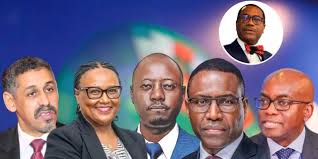
The African Development Bank’s presidential election on May 29 promises intense competition as five candidates vie for control of the continent’s premier financial institution, with outcomes largely determined by the voting power of ten influential shareholders.
The candidates include Amadou Hott (Senegal), Swazi Bajabulile Tshabalala (South Africa), Sidi ould Tah (Mauritania), Samuel Munzele Maimbo (Zambia), and Mahamat Abbas Tolli (Chad). Unlike typical elections, voting power corresponds to capital contributions rather than the one-country-one-vote principle.
Nigeria leads with 9.333% of voting rights, followed by Egypt (6.330%), United States (6.092%), Japan (5.443%), and Algeria (5.331%). These top five shareholders, along with South Africa, Morocco, Germany, Canada, and France, collectively control 54.051% of voting rights, essentially determining the election outcome.
The complex voting system requires winners to secure dual majorities: 52.183% from African regional members and 54.05% from all members combined. Nigeria’s position proves particularly influential, representing 15.806% of regional member votes, making it the ultimate kingmaker in this contest.
Current dynamics show Zambia’s Samuel Munzele Maimbo claiming support from the Southern African Development Community and Common Market for Eastern and Southern Africa, though South Africa’s competing candidacy complicates this backing. Mauritania’s Sidi ould Tah reportedly enjoys support from Côte d’Ivoire, France, and Gulf states, while speculation suggests U.S. backing for Maimbo.
With most major shareholders keeping voting intentions private, intense lobbying continues in Abidjan during the Annual Meetings. The election’s multi-round format allows for strategic vote transfers, adding further complexity to an already unpredictable race where regional rotation considerations and candidate profiles will ultimately determine who leads Africa’s development agenda.
